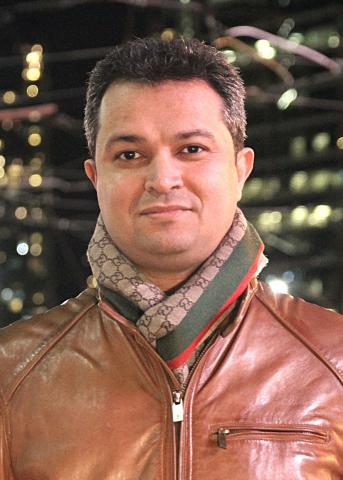Interview with longlisted author Mohammed Hasan Alwan
09/02/2017

When did you begin writing A Small Death and where did the inspiration for it come from? Did the novel take long to write and where were you when you finished it?
I began writing the novel at the beginning of 2015. It was a cold winter in the Canadian city of Ottawa and it so happened that I was reading part of a biography of Muhyiddin Ibn 'Arabi. I spent days gathering pieces of information about his life, still with no intention of writing about him. Gradually I began to feel annoyed about how little we know of Ibn 'Arabi, since there is no documented history of his life. Perhaps this was among the works by him which are lost. It occurred to me to reconstruct his life story in fictional form, imagining him as a human being - a child, young man, lover, husband and father from his birth until his death. Immediately I began to write and found myself engrossed in the writing daily, in a way I had not been when writing my previous novels. Despite being busy at that time with my doctoral thesis, I spent delightful hours deep in the imagined worlds of Ibn 'Arabi. Sitting down to write was like boarding a time machine and going back in time eight centuries. I finished writing it within a year and felt a sense of loss.
How have readers and critics received it?
Most readers consider that it is very different to my previous novels. That's right. Everything I've done in this novel is different to what I've done before. The style, language, research behind it, the narrative atmosphere and the logic of time and place. This is the first time I've written a novel not set in the present or recent past, and about the life of a well-known historical character. For the first time I have had to do research, looking in hundreds of books to find specific details about that era and society. It's also the first time that the structure of the story was more or less complete in my mind before I began to write and that I thought carefully about the linguistic style to make sure it suited the historical period. Critics haven't written about it yet, perhaps because it is only recently published, or maybe because of its large size (592 pages). Some basic critical reviews have been published in different Arabic newspapers but nothing which could be described as an in-depth critical study.
What is your next literary project after this novel?
It looks like I will continue to be drawn to the past for a while. I am thinking about another historical work, although set in a time a little closer to ours than Ibn 'Arabi's. There will be no real characters from history this time. I seem to be charmed by the pleasure of exploring the depths of history in fiction. I hope readers will not become bored by that.
(Read this article in Arabic here)
